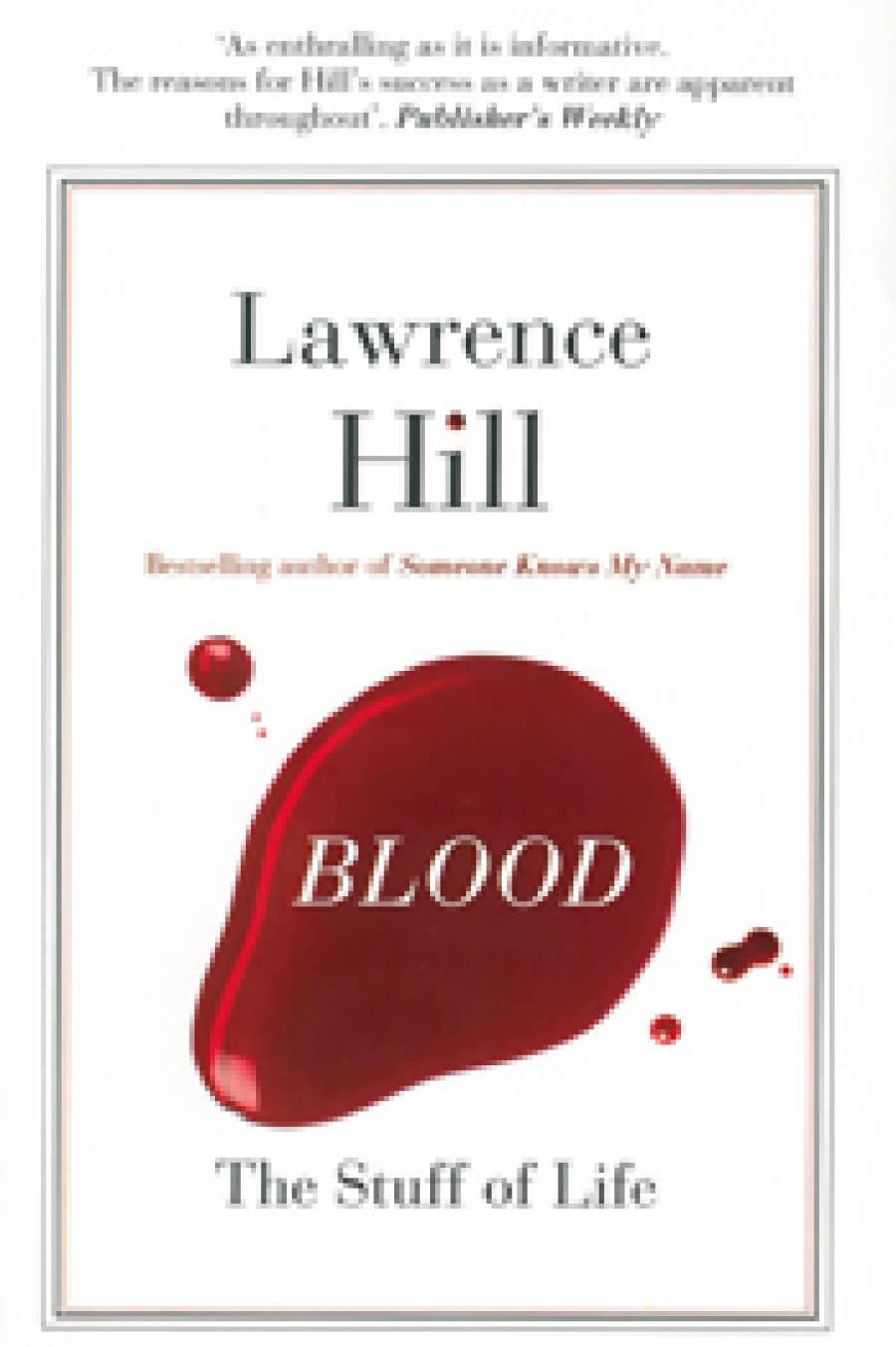
- Free Article: No
- Contents Category: Biology
- Review Article: Yes
- Article Title: Mystic blood
- Online Only: No
- Custom Highlight Text:
Lawrence Hill is the son of a white mother from Chicago (‘a kickass civil rights activist’) and a black father (‘most recently from Washington DC … urban, educated, lower middle class’), but grew up in Toronto. Blood: The Stuff of Life, the ninth of his books, originated as the Canadian Broadcasting Commission’s Massey Lectures, an annual series of broadcasts inaugurated in 1961 as a forum where major contemporary thinkers could address important issues of our time. The Australian equivalent is the ABC’s Boyer Lectures. - Book 1 Title: Blood
- Book 1 Subtitle: The stuff of life
- Book 1 Biblio: NewSouth Publishing, $24.99 pb, 374 pp, 9781742234137
The book does not wear its origins lightly. It is understandably Canada-centric, with references to people and institutions largely unknown outside the country, distracting for a non-Canadian reader. If a Boyer Lecture series were replete with equivalent Australian detail, I cannot imagine it being snapped up by a university publishing house in Toronto.
A second corollary of its origins is that the text is clear and accessible. As a broadcast, it is well paced and linear, maximising the impact of what might otherwise have been a kaleidoscopic variety of issues the speaker raises around blood. As a text, it sometimes suffers. Sentences without verbs. A surfeit of memoir. Very chatty. The memoirs are omnipresent, self-referential, de trop: broken beer bottles, diabetes, cholera, childhood fisticuffs, failing biology exams, children, stepchildren. A radio audience might find immediacy in such references; for a reader they quickly pall.
In his introduction Hill writes, ‘I have shared two intimate stories from my own life to underline the different ways that I saw – and we perhaps all see – blood in the body’. These are just the first of many intimacies. Two paragraphs later, the opening confession: ‘I have had a lifelong obsession with blood, and I’m not the only one.’ Most of us are interested rather than obsessed.
 Lawrence Hill
Lawrence Hill
(photograph supplied)
The book addresses two major issues: blood and race. For the first, Hill casts an extremely wide net: transfusions and blood banks; menstruation and sanitary pads; blood ‘doping’ and erythropoietin; blood sports, boxing and ice-hockey; vampires and witches; Passover and ‘passing’; duelling and guillotines; Lady Macbeth and Sor Juana; Judaism, Christianity, Islam, and so on. Thus blood is a point of departure for the author’s reflections on the human condition – our origins, history, religions, traditions, literature, activities – as the Massey Lectures require, important issues of our time.
The tone, however, is descriptive rather than analytical. For example, Hill distinguishes ‘blood doping’ (storing one’s own blood for reinfusion, e.g. just before a gruelling stage in the Tour de France) and other ways to achieve the same end – altitude training, for example – without exploring why one means to the same competitive end is unsporting, and the other not; why chemical agents (anabolic steroids, growth hormone, erythropoietin etc.) are proscribed, but a gamut of physical (and psychological) interventions not.
More importantly, Hill fails to inform his readers that much of what had been ascribed to ‘blood’ is the product of the interaction between genes and environment. The first half of the book is innocent of any mention of DNA; most references are in the last few pages. In discussing race, Hill refers to all sorts of aspects of heredity – from royal families to his own parents and children – as bloodlines, a term now better reserved for thoroughbred racehorses. He asks whether, should his children become writers, ‘will it be because the writing gene in my own veins slipped into theirs?’ I’m all for ellipsis, but this is tosh.
Hill understandably devotes a considerable time on questions of race throughout the book, specifically in the final chapter. He notes the extent to which any Negro ‘blood’ in America – ‘even a single drop’ disqualified the bearer from being white, which is palpably appalling prejudice. Essentially, all present African Americans have an admixture of Negro and other genetic forebears; the flamboyant academic Henry Louis Gates Jr is quoted as putting the average figure for European genes in African Americans as about twenty per cent. It will be interesting to find whether this figure is supported by the extent to which the genome of self-identified African Americans contains Neanderthal DNA sequences, which represent 1–4 per cent in European genomes, but none in Africans.
The most disturbing aspect of Hill’s book is that he perhaps unconsciously accepts the ‘single drop of blood’ canard: ‘passing’ as white is thus seen as betrayal. Anatole Broyard, the celebrated literary critic and son of Louisiana Creoles, had light skin colour and ‘passed’ as white. Hill writes ‘[He] could not, even with death at the door, say the three words “I am Black”.’ Some of Broyard’s forebears on both sides were European; some African. Henry Louis Gates Jr is quoted as arguing that Broyard ‘[was] shelving his true identity in order to inhabit one that he purposefully constructed’. Another construction would be that Broyard’s light skin gave him a choice, and that in the United States at the time his preference to be Caucasian rather than African was not only possible but sensible.
Hill’s question, ‘How do we use blood to differentiate between groups of human beings?’ misses the point for the twenty-first century. What is amazing, and life-affirming, is the 99.9 per cent of genes shared across humankind: the differences are not ‘in the blood’ or the genes, but in the environments we have constructed. Passages like ‘through blood, many people commune with God’ and ‘blood speaks to our deepest notion of truth and sanctity’ are not the main game. If ‘major contemporary thinkers’ want ‘to address important issues of our time’, it needs to be on the basis of science, not mystical utterances.


Comments powered by CComment